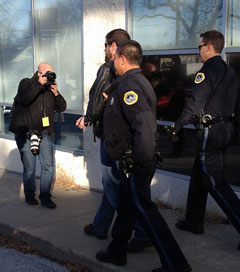As voters in Iowa prepared to throw their support behind Republican presidential candidates last night, Occupy activists in Iowa are wrapping up a week of direct actions aimed at letting both political parties know that none of their corporate-sponsored candidates represent the 99 percent.
At least 62 arrests were made during nonviolent actions since Occupy Des Moines held a “Peoples Caucus” a week ago to organize actions. Dozens of protesters have showed up at the front doors of every Republican candidate's campaign office in Des Moines during the past week.
A protest that blocked the entrance to the Democratic Party headquarters led to 12 arrests on Thursday, and on Sunday night, about a dozen activists attempted to swarm a Democratic “war room” in a downtown Des Moines hotel in an attempt to meet with Democratic National Committee Chair Debbie Wasserman Schultz. Activists held a die-in at the hotel on Monday after Wasserman Schultz declined to meet with the protesters, according to Occupy activist David Goodner.
“Occupy Des Moines started the Occupy Iowa Caucus campaign largely to address the problem of big money in politics – the presidential candidates and their Super-PACs have spent $200 for every vote expected in tonight's Caucus,” Goodner said. “Both the Democratic and Republican Parties are largely representing the interests of the major corporations.”
Federal court rulings in 2010 allowed corporations, individuals and unions to give unlimited contributions to political actions committees and nonprofits supporting individual candidates. The Center for Public Integrity reports that such groups, known as Super-PACs, spent $12.9 million supporting Republican presidential candidates in Iowa through New Year's Day, with most of the money paying for television ads. Top beneficiaries were Mitt Romney and Rick Perry, who enjoyed $4.6 million and $3.7 million in help from outside spending groups, respectively.
Super-PACs are not allowed to coordinate with a candidate's official campaign, but activists say millions in untold corporate donations gives big business too much influence over American democracy.
“Everyday people shouldn't have to wonder who the candidates work for,” Goodner said.
A group called Occupy Iowa Caucus has made national headlines with its campaign asking both Democrats and Republicans to vote “uncommitted” or “no preference” to express their dissatisfaction with the political status quo.
“It's a great tactic to poke the political parties on both sides of the aisle to say that we are not happy with the corporations that are running politicians for office and the 99 percent needs real political representation,” Goodner said of the campaign.
Occupy Iowa Caucus could make a dent in Democratic caucuses, where President Obama is considered the shoo-in candidate. In many precincts, the Occupiers could win “uncommitted” delegates if at least 15 percent of the caucusing Democrats vote uncommitted.
The momentum to “occupy the caucus” may have reached its peak in Iowa, but activists like Goodner hope Occupiers in other cities are taking note.
“The model we created in Iowa – taking on Wall Street greed and corruption by going after the political parties and politicians that serve the corporate agenda – is one path forward for the Occupy Wall Street movement as the eyes of the nation now turn to New Hampshire, South Carolina, Nevada, and the Super Tuesday primary states,” Goodner said. “The political system in this country must put communities before corporations and people before profits or prepare to be occupied.”
Thank you for reading Truthout. Before you leave, we must appeal for your support.
Truthout is unlike most news publications; we’re nonprofit, independent, and free of corporate funding. Because of this, we can publish the boldly honest journalism you see from us – stories about and by grassroots activists, reports from the frontlines of social movements, and unapologetic critiques of the systemic forces that shape all of our lives.
Monied interests prevent other publications from confronting the worst injustices in our world. But Truthout remains a haven for transformative journalism in pursuit of justice.
We simply cannot do this without support from our readers. At this time, we’re appealing to add 50 monthly donors in the next 2 days. If you can, please make a tax-deductible one-time or monthly gift today.
